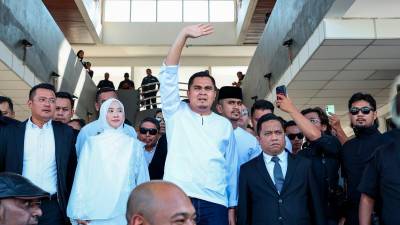PETALING JAYA: The recent clash between Umno Youth chief Dr Akmal Saleh and DAP has stirred debate over its implications for the unity government and Malaysia’s
multi-ethnic political landscape.
Analysts offered mixed views, with some arguing DAP’s reaction inadvertently boosted Akmal’s profile, while others see his conduct as part of the wider challenge of managing a coalition of diverse parties.
Nusantara Academy of Strategic Research senior fellow Prof Dr Azmi Hassan said Akmal’s remarks should not be taken as Umno’s official position.
“His actions are neither endorsed nor encouraged by Umno. But in a way, Umno does need someone like Akmal,” Azmi said.
He added that DAP’s strong response may have worked in Akmal’s favour.
“The problem with DAP reacting strongly is that it actually gives Akmal more credibility. Within Umno, he’s only the youth chief.
“Yes, by virtue of that role he sits on the Supreme Council, and perhaps he has influence in Malacca, but not nationally,” he said.
Azmi said Umno is unlikely to rein him in given his grassroots appeal.
“Sometimes he goes overboard in championing issues for political mileage. But that’s all the more reason DAP should just ignore him.
“Whether this creates tension within the unity government, I think Dr Akmal is a very small matter compared to the overall relationship between the coalition parties,” he said.
Singapore Institute of International Affairs senior fellow Dr Oh Ei Sun offered a different view, saying Akmal’s approach echoed that of many former Umno Youth chiefs.
“Akmal’s political style is not unusual as it mirrors that of his predecessors,” Oh said, noting that this often involved raising sensitive issues to build political capital
and burnish their image as community representatives.
He said DAP, with its largely non-Malay base, would “understandably have to react accordingly”.
While Umno has at times distanced itself from Akmal in the name of coalition unity, Oh suggested recent developments pointed to a more delicate balance.
“DAP is boycotting Akmal specifically. But if the Umno mainstream is to endorse him, then inter-party ties would likely be strained,” he said.
International Islamic University Malaysia associate professor Dr Syaza Shukri, who is also a fellow at the ISEAS–Yusof Ishak Institute, said the coalition remains broadly stable, though the row underscores its fragility.
“I think the coalition as a whole is still stable because it really is a
DAP-Akmal dispute. But if it drags on and other leaders get pulled in, then it becomes harder to explain them working together,” she said.
Syaza described the unity government as a “coalition of convenience” rather than an ideological alliance, complicating cooperation.
“If stability is the goal, then it’s easy to work together and put the coalition first. But if the end goal is always for the party to come out on top, then of course the priority would be the party,” she said.
